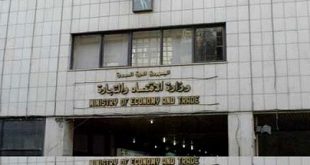Damascus, SANA – Director-General of the Syrian Export Development and Promotion Agency (EDPA) Ehab Esmandar said that Syria’s exports of intermediate goods have increased in 2014, amounting to 71.5% of total exports.
In a statement to SANA, Esmandar said that 69% of Syrian exports went to the Arab countries, particularly Egypt, Jordan, and Lebanon, while the share of EU countries from total Syrian exports reached 9%, marking a 70% decline in comparison to 2010 due to the unjust economic sanctions imposed since 2012 on the Syrian goods, especially oil exports.
According to EDPA data, Syria’s imports from Arab countries reached 22%, growing by 61.8% in comparison to 2010, while the share of imports from Europe in total Syrian imports has dropped to 12% in 2014.
96.5% of Syria’s total imports came from its major trading partners, on top of which is China (11.8%), followed by Lebanon (8.9%), then South Korea, Ukraine and Egypt. In 2014, Syria’s imports from Turkey decreased by 18% compared to 2010.
Esmandar stressed the need for reconsidering trade agreements in order to set up appropriate policies to support local products and enhance the gross domestic product (GDP).
He said that the trade agreement with Turkey was suspended, and that there are negotiations with the customs union of Belarus, Kazakhstan, and Russia, as well as a number of countries whose markets have high demand for Syrian exports, to promote Syrian products.
The EDPA facilitated the participation of several Syrian companies in foreign exhibitions and fairs such as SYRIAMODA Fair held in Beirut, Gulfood Exhibition in the Dubai World Trade Center, International Flower Fair in Baghdad, and WorldFood Moscow 2014.
Esmandar said that the five-year plan for 2010–2015 on developing exports was set up and approved by the Higher Council for Exports. The plan provides for subsidizing a number of Syrian export products such as clothes, food products, and olive oil.
Rasha Raslan / Hazem Sabbagh
 Syrian Arab News Agency S A N A
Syrian Arab News Agency S A N A




